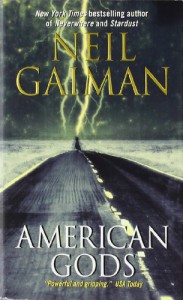Robin's Reads
I've been hooked on books since childhood, and still am. I usually have at least three books going at any given time. After nearly two decades teaching middle school, I've developed strong opinions about YA fiction. A married mother of many adult children, and a practicing Catholic, my moral paradigms do play into my reviews.
American Gods: a review

American Gods, by Neil Gaiman.
I'll start by saying that I am a new fan of Gaiman. I came into Gaiman land via "The Graveyard Book", which I loved. Then I swallowed "Coraline" in an afternoon and had trouble sleeping for days. Buttons now freak me out. In both of these novels, which were written for children, love conquers, but it may not look like love the way we think love should be. So I picked up American Gods hoping for more of that twisted but righteous way of seeing things. I'm still not sure whether or not i found it there.
On the surface, this is a tale of the conflict between older gods-- from the Nordic pantheon to Egyptian goddesses like Bast, and several others I humbly admit to not recognizing-- and the newer American gods of media, commerce, and consumption. On another level it is a story of a single person, the man we know only as Shadow, a recent prison parolee with a basically decent heart despite his criminal tendencies, as he struggles to make sense of his rather unhappy life. Shadow is hard to like because he is so enormously passive (those who have read the book will get my pun there), and never questions the exceedingly bizarre things that happen. But he is hard to dislike too, because he has been so abused and yet he does not abuse others. I never really felt an emotional connection with him, yet I did feel a need to know what happens to him.
But underneath these two stories, there is a set of vaguely-formed philosophical questions: about what makes up the truth of reality, and what beliefs are, and whether or not they matter, and if so, how. Are there gods? Did humanity invent them? Do they affect our daily lives? Can they die? If there are gods, is that a good thing, or a bad one? Can we even control our own lives? So many metaphors abound, and the "backstage" part of the book really had me wondering. But in true Gaiman fashion, he never answers the reader's questions about "backstage". You have to decide for yourself what really happens there.
Gaiman has marvelous vision: he sees the world ( and other worlds) through a twisted lens which I find fascinating. he;s also a skilled writer, with a generous gift of using words well. I enjoy reading his descriptions, which are never quite what one would expect, but always leave you feeling like you saw more than he told. Perhaps my favorite part of this book were the short little vignettes when he traverses back in time, to when the "old gods" were carried here to America, by various immigrants, from a modern New York Taxi cab driver all the way back to a prehistoric tribe walking across the Bering Strait.
I also enjoyed how he threads throughout the novel the ravenous need that the various gods and goddesses have for us, their worshipers, in order to survive. I've never really considered that kind of reciprocal relationship between divine beings and their followers. I was however quite disappointed that he did not include the Big Three Religions of Judaism, Christianity, and Islam. Those gods never appear in the book. I'm wondering why he chose to leave them all out. Here's what he says about religion in the book:
"Religions are, by definition, metaphors, after all: God is a dream, a hope, a woman, an ironist, a father, a city, a house of many rooms, a watchmaker who left his prize chronometer in the desert, someone who loves you--even, perhaps, against all evidence, a celestial being whose only interest is to make sure your football team, army, business, or marriage thrives, prospers, and triumphs over all opposition."
Reading Gaiman, I think, requires a careful and patient attention to small details, and a willingness to wait for understanding, and to accept things that seem completely unrelated to the main plot line, but later are revealed as vital. Not unlike watching a movie, where you start with four or five unrelated scenes and then they move towards a union. Don't expect big battles and massive action scenes in here: you'll be disappointed. Expect a quiet, almost brutally methodical pace that, if you take the time, reveals many treasures of thought, and some truly beautiful phrasing.
Some of the surprises at the end I saw coming. Some I certainly did not. Most --but not all --of the loose ends are tied up: I especially liked the way Laura was wrapped up at the finale.
On the whole I am glad I read it. It was dark: lots of murders and some rather nasty behaviors, creepy dreams, dead people roaming about as they slowly rot, and so forth. But I like a book that asks the reader to ask questions. So I am giving this one a thumbs up.
Plus how can you not like a book in which a character says this:
"What I say is, a town isn't a town without a bookstore. It may call itself a town, but unless it's got a bookstore it knows it's not fooling a soul."
Amen.


